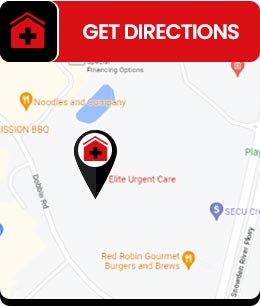Urgent Care with EKG (Electrocardiogram) in Columbia MD
An ECG is a test that measures the electrical signal from the heart to diagnose various cardiac problems. An EKG is a rapid and painless test that your medical provider can perform to monitor your heart rhythm and assess your heart. If you have cardiovascular disease or are at risk of developing it, an EKG test can save your life by detecting issues with the heart muscle, valves, or rhythm. Elite Urgent Care provides EKG services. Our board-certified doctor, Dr. Nasser Nasseri, MD, and his staff treat people who have had cardiac problems and provide prevention recommendations. For more information, contact us today or book an appointment online. We are conveniently located at 6100 Dobbin Rd, Suite A Columbia, MD 21045.


Table of Contents:
What does an EKG check for?
What is the difference between an ECG and an EKG?
Can EKG tell about a heart attack?
Why would a doctor order an EKG?
EKGs are an available medical tool to help examine the electrical activity of the heart. Schedule your appointment today!
An electrocardiogram is a safe, fast, and non-invasive way to examine the electrical activity of the heart.
Your heartbeat is controlled by an electrical system that controls when the upper chambers of the heart (the atria) contract and when the lower chambers of the heart (the ventricles) beat. Typically, this happens in a synchronous pattern and at a predictable rate.
A change in a heartbeat can indicate a heart problem such as a heart attack or arrhythmia.
It measures the time it takes for electrical waves to travel from the atria to the ventricles, showing whether the electrical activity is too fast or too slow, or chaotic.
It also measures the amount of electrical activity going through your heart, which can help your doctor determine if your heart is working too hard.
In an EKG, small electrodes are placed on the chest and extremities. Electrodes are removable stickers with wires that connect to an EKG machine, which records electrical signals from the heart and displays them on a monitor.
The printout shows your heart’s electrical pattern. This is done to record your heartbeat at the time. This is important because some changes in the heart’s electrical activity are temporary. For this reason, it can be helpful to have clues about changes in your heart’s normal electrical pattern.
ECG and EKG are two abbreviations that are commonly used in the medical field to refer to the same test. Both terms are related to diagnosing heart conditions by measuring the electrical activity of the heart. However, there are slight differences between the two terms, which this essay will explore in detail. The difference in terminology is due to the origin of the abbreviations. ECG is derived from the Greek word “kardia,” which means heart, while EKG is derived from the German word “elektrokardiogramm.” Despite the difference, both terms refer to the same medical test, which measures the electrical activity of the heart.
The ECG or EKG test is a non-invasive procedure that involves attaching small electrodes to the skin on the chest, arms, and legs. These electrodes detect the electrical signals generated by the heart, which are then recorded and displayed on a monitor or printed on paper. The test is painless and usually takes a few minutes to complete. The results of the test can help healthcare professionals diagnose various heart conditions, such as arrhythmias, heart attacks, and heart failure.
ECG and EKG tests are used interchangeably, but there is a slight difference between the two terms. ECG is the more commonly used term in the United States, while EKG is the preferred term in Europe. The difference in terminology is due to the way the test is performed. In the United States, the test is usually performed using a machine that records the electrical signals generated by the heart. In Europe, the test is usually performed using a machine that displays the electrical signals generated by the heart.
Despite the slight difference in terminology, both ECG and EKG tests are similar in their purpose and function. The tests are used to diagnose various heart conditions by measuring the electrical activity of the heart. The test results can provide valuable information to healthcare professionals about the health of a patient’s heart and can help them make informed decisions about treatment options.
An EKG is one of several tests that can help diagnose a heart attack. This is often one of the first screenings performed when someone goes to the hospital with heart attack symptoms.
Abnormal EKG readings can not only indicate the possibility of heart muscle damage but can also be the result of reduced blood flow through the coronary arteries. This is usually the trigger for most heart attacks.
An EKG can also diagnose abnormal heart rhythms called arrhythmias.
In addition to an EKG, blood tests are done if a heart attack is suspected. Damaged heart tissue often releases certain proteins called troponins. Abnormally high levels of troponin T and troponin I are often a sign of a heart attack.
Your doctor may want to do an EKG if you have signs of possible heart problems. These include palpitations, rapid heart rate, or chest pain. You may also need an EKG if you feel short of breath, dizzy, confused, tired, or weak. If you have a family history of heart disease, your doctor may order an EKG even if you have no signs or symptoms.
Your doctor can use an EKG to look for signs of a heart attack that you hadn’t seen before. The procedure can also be used to check for irregular heartbeats, problems with the structure of the heart, or blockages in the arteries of the heart.
Electrocardiogram services are available at Elite Urgent Care. Our board-certified doctor, Dr. Nasser Nasseri, MD, employs the most sophisticated tools to identify heart and vascular disorders in those who might be at significant risk. For more information, contact us or request an appointment online. We are conveniently located at 6100 Dobbin Rd, Suite A Columbia, MD 21045. We serve patients from Columbia MD, Elkridge MD, Ellicott City MD, Laurel MD, Clarksville MD, Fulton MD, Jessup MD, and surrounding areas.
Check Out Our 5 Star Reviews









